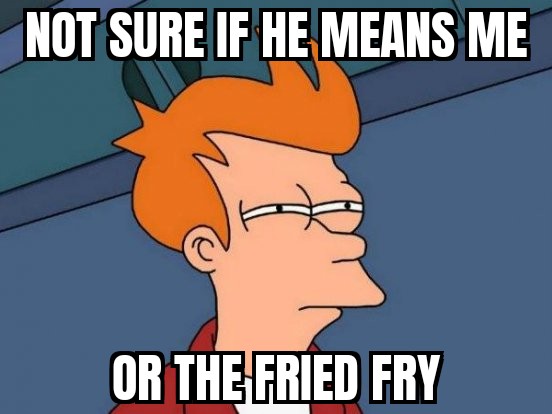Fry is the name for baby fish.
Showerthoughts
A "Showerthought" is a simple term used to describe the thoughts that pop into your head while you're doing everyday things like taking a shower, driving, or just daydreaming. The best ones are thoughts that many people can relate to and they find something funny or interesting in regular stuff.
Rules
- All posts must be showerthoughts
- The entire showerthought must be in the title
- Posts must be original/unique
- Be good to others - no bigotry - including racism, sexism, ableism, homophobia, transphobia, or xenophobia
- Adhere to Lemmy's Code of Conduct
"To fry" means to cook in oil or fat. A distinction we can make is "deep fry" like the chicken, and "pan fry" for the other 2. We don't use woks as much here so really the only difference between fried rice and a fried egg is whether you stir it or flip it, but both are still cooked in a pan with oil.
Fry means to cook with oil.
You have pan frying, deep frying, shallow frying, they all have additional descriptors, and you can usually infer the type from the product. You can always say deep fried chicken, but that’s also assumed when you say “fried chicken” already. If it’s fried different you would maybe say “pan fried chicken” instead.
This is why you sometimes have to make it specific by saying "deep fried" or "pan fried".
Deep fried? Can I get deeper fried ones? How about the deepest fried ones?
Or isn't this like the cooked stages of steak?
Non-native speaker, too.
Deep fried means submerged in oil
We have some oddly obtuse language for cooking in English.
We use the same phrase to describe foods that are high in temperature and contain lots of capsaicin (hot). We can use spicy, I suppose, but it gets a little odd describing foods with lots of spices that aren't chili pepper. I generally say "well-spiced" and that gets the message across. We hardly have a way to distinguish "types of spicy" flavoring, such as that from chili, horseradish or peppercorns. I've seen some people start to say mala (loan word, 麻辣) for numbing spice, but that's uncommon and new.
That's just a few examples.
Most of our more precise language for cooking comes from other languages, like French. To saute, to braise, bain-marie, julienne, sous vide, etc. I'm not sure why English has so many lexical gaps specifically around cooking.
It's gotten WAY better. Some recipes from, like, the colonial era, have instructions like "cook well in a cold oven until done", so progress has been made, it's still often imprecise and clumsy.
